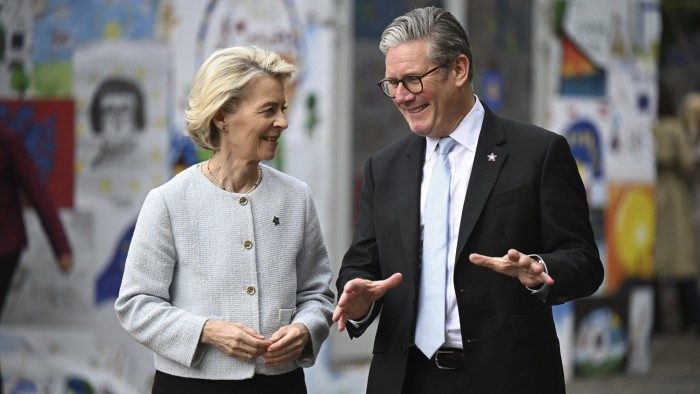Good morning. Pro-EU centrist Nicuşor Dan has won Romania’s election in a stunning upset over his ultranationalist Eurosceptic opponent. The mayor of Bucharest rode a surge in turnout to claim more than 54 per cent of the vote. Dan’s in-tray is large and daunting, but his victory is a major fillip for the country’s EU and Nato allies that were deeply afraid its pro-western alignment was at risk.
The centrist candidate also won the first round of Poland’s presidential election yesterday, but Rafał Trzaskowski’s lead over his rightwing rival was narrower than his supporters had hoped ahead of a tense run-off.
Meanwhile in Portugal, while the governing centre right topped a parliamentary poll, the far-right Chega tied with the country’s social democrats in second place.
Today, our cross-channel team preview the EU-UK summit where negotiations have gone down to the wire, and Laura reports on the frantic European lobbying of Donald Trump ahead of his call with Vladimir Putin this afternoon.
Reset reloaded
The EU and UK are holding their first summit since Brexit today. But just how far the vaunted “reset” of relations will go is under question, after negotiations yesterday continued overnight, write Andy Bounds and Jim Pickard.
Context: Senior EU officials will meet Prime Minister Sir Keir Starmer to sign a defence and security partnership in London. They will also try to agree on long-term fishing rights in UK waters, and outline areas for future co-operation.
The main event at Lancaster House with the British prime minister, presidents of the European Council and the European Commission, António Costa and Ursula von der Leyen, will last just two hours, followed by a press conference. Then Starmer will treat his guests, who also include foreign policy chief Kaja Kallas and Brexit commissioner Maroš Šefčovič, to lunch on a warship.
The symbolism is obvious — the UK wants to parley its military might for better access to EU markets, without rejoining the single market or customs union.
For the EU, the main target is keeping its access to British fishing waters, which expires June next year. It has said it can’t agree on anything without securing that.
British negotiators have already signalled they could accept rules set by Brussels to get a veterinary deal that would allow agrifood products and animals to cross borders with less paperwork.
But they are wary of striking a long-term fish deal, one of the reasons why the opposition has already framed the meeting as a “surrender summit”. They also want to limit EU demands to allow 18- to 30-year-olds to live and work in each other’s countries.
But the pressure to strike an agreement, which Starmer is already touting as a fait accompli, is high for the UK government. Brexit remains a big dividing line of British politics: the negotiations were front-page news in much of the UK press over the weekend.
In the EU, the stakes are much lower, with governments under little pressure to relent.
Chart du jour: Running low
The EU will need to spend at least €10bn more than last year to refill its winter gas stores, with reserves heavily depleted.
A lot of talking
EU leaders have rushed to co-ordinate with the White House ahead of US President Donald Trump’s phone call with Russian President Vladimir Putin today, writes Laura Dubois.
Context: Trump announced on Saturday that he would speak to Putin and Ukrainian President Volodymyr Zelenskyy today, further intensifying efforts for a ceasefire. The Russian president skipped a meeting with Zelenskyy on Thursday last week. The talks were attended by a low-level delegation instead, and yielded no breakthrough.
EU countries have been largely excluded from the peace efforts, and long feared that Washington could conclude a deal with Moscow that would be against Kyiv’s interests.
Hence, European leaders have been trying to influence Trump ahead of today’s crucial call. Last night Britain’s Sir Keir Starmer said that he, German Chancellor Friedrich Merz, French President Emmanuel Macron and Italian premier Giorgia Meloni spoke with Trump to press their case.
Starmer said the leaders “discussed the need for an unconditional ceasefire and for President Putin to take peace talks seriously.”
But the Europeans have not always presented a united front. Merz has had to cool a spat between Paris and Rome, after Meloni was excluded from a small group meeting of European leaders who first phoned Trump on Friday.
To demonstrate her sway with the US administration, Meloni then arranged a meeting between European Commission president Ursula von der Leyen and US vice-president JD Vance in Rome yesterday.
“I know how much you are engaged in ending this war, and I thank you for that,” von der Leyen said to Vance at the start of their meeting. “What is certainly important now is that we push that things are moving forward, and I think the next week will be crucial in this regard.”
What to watch today
-
EU-UK summit takes place in London.
-
EU humanitarian commissioner Hadja Lahbib hosts European Humanitarian Forum.
Now read these
Are you enjoying Europe Express? Sign up here to have it delivered straight to your inbox every workday at 7am CET and on Saturdays at noon CET. Do tell us what you think, we love to hear from you: europe.express@ft.com. Keep up with the latest European stories @FT Europe




